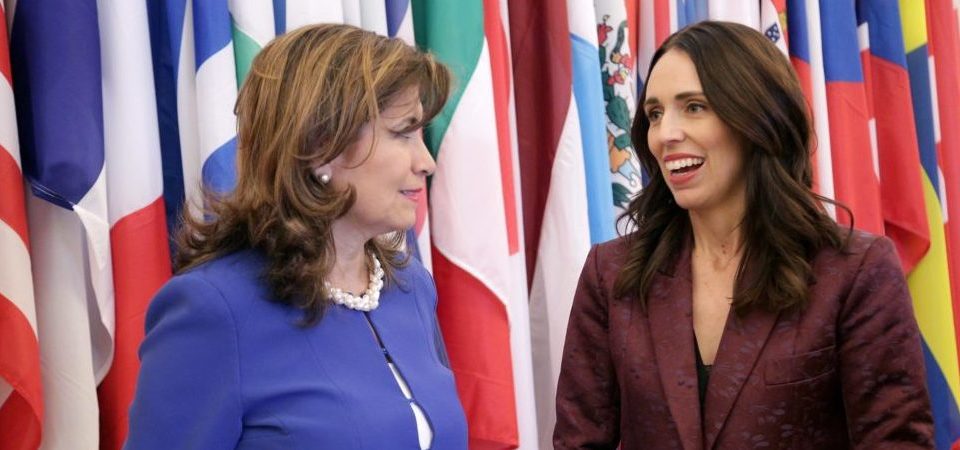In a meeting with Nobel Laureates in 2015, the Dalai Lama said, “Western women will save the world.” By any measure, that is a remarkably bold statement, especially coming from a non-western, Buddhist male spiritual leader.
As we move into the third decade of the 21st century, the evidence to support this contention is mounting. Consider that of the 206 sovereign nations worldwide, 24 are now led politically by women. That may seem like a pittance, but ten years ago that number was just seven.
Angela Merkel, who is generally considered the de facto ‘leader’ of Europe, has been German Chancellor for 15 years. Four of the five Scandinavian social democracies are now led by women. The number two political leader in the United States is now a woman of color.
Arguably, the most effective political leader in the world today is New Zealand Prime Minister Jacinda Ardern. Recently re-elected to a second term, Ardern’s leadership is shaped by a potent blend of compassion, charisma, and steely resolve. She has successfully navigated the thorniest of issues from gun violence, to marshaling a hugely successful nation-response to COVID, to shaping a transformative, clean energy policy for New Zealand.
“I am a thinker, and I do muse over things a lot and am constantly assessing whether I am doing enough or what I should be doing more of to make sure I am not letting anyone down.” – Jacinda Ardern, Prime Minister, New Zealand
Wouldn’t it be wonderful if all politicians thought that way? Jacinda Ardern’s record shows she not only “talks the talk, she walks the walk”.
The world is becoming a stage for the emerging political power and leadership of women, locally, nationally, and globally.
It’s about time.
Men Have Been Dominant for Too Long
Think about the human journey over the past three or four thousand years. Boil it down to simple terms: men have been in charge, women have been treated as property, and nature has been plundered rapaciously and relentlessly. History has been shaped by men. It is a litany of stories of men in bloody, violent confrontation and conquest. It’s been that way pretty much ever since humans gave up caves for permanent settlements.
It’s codified in the Bible. The “Old Testament” declares that men are in charge, women are property, and nature is a commodity made to be exploited by men.
‘”Man enjoys the great advantage of having a god endorse the code he writes; and since man exercises a sovereign authority over women it is especially fortunate that this authority has been vested in him by the supreme being. For the Jews, Mohammedans, and Christians among others, man is a master by divine right; the fear of God will therefore repress any impulse towards revolt in the downtrodden female.” – Simone de Beauvoir, The Second Sex, 1949
Human societies the world over have been and still are hierarchical. Men are on top. Men make the rules. Nature is reduced to a commodity for men to exploit. Females of the human species are marginalized, oppressed, and treated, like nature, as a form of exploitable property.
Humans have long operated under the assumption they are separate and superior to nature rather than a part of it. That has encouraged a brand of mindless cultural overreach that now threatens the destruction of life on Earth. The good news is, more and more, the world is embracing gender equality and cooperation. When women have equal access to the levers of power, good things happen.
The way forward requires a course correction at the most fundamental cultural levels. It starts with the understanding that all humans are created equal. That includes female human beings. In a fair and just society, by virtue of being human, women are equal to men in all ways. In a fair and just world, women are entitled to an equal voice.
The distinguished author of The Chalice and the Blade, Riane Eisler, offers this understanding:
“What we need is a new way of thinking that goes beyond secular vs. religious, left vs. right, eastern vs. western, socialist vs. capitalist, and so on. Old social categories ignore the impact of childhood and gender relations on how our brains – and hence our beliefs and behaviors – develop. Nor do any of them provide the new economics, narratives, and language to meet the challenges facing our world. The real struggle for our future is between the domination configuration and the partnership configuration worldwide. Once we understand this, we can build a solid foundation for a more sustainable, equitable, and caring partnership-oriented world.” – Riane Eisler
Equal Rights and Education
In the U.S. and in Europe, the right to vote for women only came a hundred years ago, after a protracted struggle with the men, who controlled politics.
The argument can be made that the right to vote marked a crucial turning point in the ascendance of women to an equal place in human society. At the beginning of universal suffrage only a century ago, the pace of tangible cultural change for women was slow. More recently, the process of substantiating equal gender rights has accelerated dramatically in places where equal access to education has become the norm.
In the U.S., more women are in medical schools now than men. In Law Schools, more than half the students are female. Women are also becoming engineers, scientists, and technology leaders in record numbers. In fact, in recent decades, college enrollment numbers for women have become significantly greater than for men. These trends favoring women in the professions are not just happening in North America and Europe, they are happening more and more around the world.
COVID and CRISPR
In 2020, the world was overwhelmed by the COVID pandemic. In that same year, the Nobel Prize in Chemistry was awarded to Jennifer Doudna and Emmanuelle Charpentier for their work in developing the chemistry of CRISPR.
“I don’t think of myself as a role model, but I can see that I am.” – Jennifer Doudna
CRISPR technology was central to the development of the vaccines that have been used the world over to quell the COVID pandemic. In fact, the Moderna COVID vaccine development was led by two women, Hamilton Bennett and Kizzmekia Corbett.
“When girls become educated, their countries become stronger and more prosperous.” –Michelle Obama
A Worthy Crucible for Cultural Change
We all must recognize that creativity, intelligence, strength of character, and a commitment to planetary stewardship are essential traits in the human struggle to contain and push back against the existential challenges of our time. We should also assume that those meritorious traits are distributed equally among males and females of our species. It follows then that our chances of shaping a life-affirming, sustainable future are best served when gender equality is the rule, and women have the same access to the levers of power as men.
I don’t necessarily agree that the world we know will be transformed and saved by women alone. There are plenty of enlightened men who already accept women as equals, and are willing to follow women when they step up to lead. One thing seems certain. If we do manage to get past the dangerously uncertain times that lie ahead, we will do it by standing together – every woman, every man, every child – on a course that offers us all the best chance for personal dignity, while caring for each other, for nature, and for the earth we all depend on.
If we humans do manage to save ourselves, it won’t just be western women, who deserve credit. The transformative world that emerges will be shaped by women and by men from every part of the planet, working together for the good of all.
I do expect history to show that at least half of those in the lead will be women.
“Women belong in all places where decisions are being made.” – Justice Ruth Bader-Ginsburg.
 Geoffrey Holland is the Coordinator of the MAHB Dialogue series.
Geoffrey Holland is the Coordinator of the MAHB Dialogue series.
The MAHB Blog is a venture of the Millennium Alliance for Humanity and the Biosphere. Questions should be directed to joan@mahbonline.org
The views and opinions expressed through the MAHB Website are those of the contributing authors and do not necessarily reflect an official position of the MAHB. The MAHB aims to share a range of perspectives and welcomes the discussions that they prompt.
